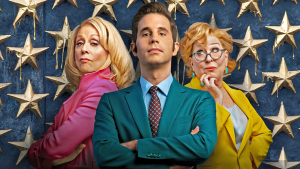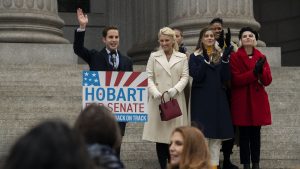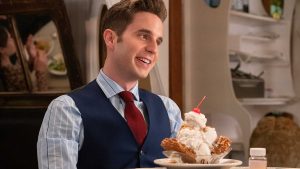Aaron Sorkin’s The Trial Of The Chicago 7 is certainly going to be a strong contender, and probably even a frontrunner, in the race for Best Picture at next year’s Academy Awards ceremony, but it’s right now, as 2020 finally nears its end and as the U.S. Presidential election creeps closer, that the whole world should be watching this film and learning or relearning the incredible story of the Chicago 7: not just the men themselves, each one a fascinating character in their own right, but the larger cultural and political significance of their trial – a trial where American governmental and legal institutions not only failed to protect the rights of protestors, but actively sought to suppress them. Although the Chicago 7 were arrested for protesting the Vietnam War, their struggle is both relevant and relatable in the modern day – in 2020 especially, as protests across the nation in the wake of an unarmed Black man’s death in June led to a violent response from our government and law enforcement.

So who were the Chicago 7, and why was their trial such a landmark moment in this nation’s history? The historical context is always important to know, and the history behind this particular case is truly fascinating. The film opens mere days before the Democratic National Convention in Chicago, 1968, as several different activist groups intent on protesting the selection of the party’s nominee, Hubert Humphrey, converged on the city from all around the country: and then, after a montage introducing each of our seven main players, we jump ahead by five months – the trial is already about to begin, and Richard Nixon’s administration personally wants each and every one of them behind bars for the maximum sentence. Whether you know what happened in Chicago or not during the convention, it’s enthralling either way as Aaron Sorkin’s story slowly begins to uncover, through the help of flashbacks, what really went down as the protesters marched through the city and ran into the heavily armed Chicago Police. Anyone who’s been paying attention to the news this year already knows what went down, even if they don’t know the exact details of this particular incident.
Throughout the chaos and violence, Aaron Sorkin’s story keeps us focused on the humanity of the Chicago 7, and contrasts that with the horrific lack of empathy from the police. Again, the discussion of “empathy vs apathy” is significant to our modern climate, and Sorkin’s film closes with a beautiful – and factually inaccurate – display of human empathy at its most inspiring and powerful. It’s never lost on Sorkin that this was the trial of real men, not just lofty ideals and philosophies. And almost every main actor in the ensemble cast plays their part to its fullest, breathing life into these little-known but incredible historical figures.

Sacha Baron Cohen and Eddie Redmayne are very much leading co-stars, in my opinion, but it’s Baron Cohen who makes the strongest impression as the tall, lanky Yippie activist Abbie Hoffman and makes a good case for why he should finally be recognized as an actor equally gifted in both comedy and drama (since apparently his starring role in The Spy wasn’t enough evidence for some of you). A Best Actor nomination had better be incoming for Baron Cohen: even despite the fact that the film cuts out some, arguably most, of Hoffman’s most eccentric real-life antics in court, Baron Cohen makes him the wittiest, most vivid character in the film – and the story’s beating heart and stand-in for most of the counterculture movement of the late 60’s.
Yahya Abdul-Mateen II, meanwhile, excels as the more stoic, solemn Bobby Seale, a member of the Black Panthers who was arrested alongside the other defendants but whose case was later severed from the others’. Seale’s mistreatment in the courtroom – including a horrifying incident in which Judge Julius Hoffman (Frank Langella) orders that he be bound and gagged, to the point where Seale is unable to breathe – is all taken from real life and shines a light on how the law itself is weaponized against the Black community just as much as the militaristic might of law enforcement. By that time in the film, you’ll already be well aware that the trial of the Chicago 7 was not a fair one, but the treatment of Bobby Seale adds violent racism and white supremacy to the mix as well. The Black Panthers, including their leader Fred Hampton (briefly but powerfully portrayed by Kelvin Harrison Jr.), don’t have a very large role in the film overall but their appearances do help to underscore the fact that any conversation about cultural and political revolution needs to include Black voices, no matter what era it occurs in – and of course, it’s an especially important message to get across since the cultural and political revolution happening in this country nowadays is largely being fueled by Black activists and their allies.

In this film, however, Eddie Redmayne’s version of the real-life Tom Hayden comes across as something of an opponent to such progressive messaging throughout most of the film. His character seems largely crafted to provide a foil for Sacha Baron Cohen’s – a stiff, uptight, idealist trying to distance himself and his group, the Students for a Democratic Society, from the counterculture movement of the Yippies. But it appears that Sorkin is also using his character to represent a number of liberal subdivisions in political activism that claim to be “for change” until that actually requires listening to the voices of underrepresented minorities or demanding comprehensive structural change within our government, from the ground up. Hayden is like so many activists who try to make their movements more “appealing” or “attractive” to the mainstream by presenting a mostly white facade to the media, at the cost of the marginalized communities they claim to be fighting for; and then he is like one of those people who seem to believe that winning a single election is all that has to be done to fix problems such as racism, but aren’t prepared to advocate for designing a new system of government that would ensure we actually see some substantial change and progress. It’s all a little bit unfair to the real-life Tom Hayden, who actually fell more in line with counterculture philosophy than the film would have you believe. Anyway, Redmayne’s performance is perfectly decent: it leans toward being a bit wooden, but his attempts to maintain a passable American accent are entertaining at least.
As for the other defendants, they have their moments. Jeremy Strong is maybe trying a bit too hard with his borderline caricature of Yippie leader Jerry Rubin, John Carroll Lynch is doing his best with what little screentime David Dellinger has been given, and Alex Sharp, Noah Robbins and Daniel Flaherty are…well, they’re there. But the other real standout on this side of the courtroom is Mark Rylance as the defense lawyer William Kuntzler, somehow confidently rocking a combover, who rallies the group during their darkest moments, adds some very natural humor to his interactions with his clients, particularly the Yippies, and holds his own against the indomitable, immovable presence of Julius Hoffman.
On the other side, well…I have fewer positive things to say about Joseph Gordon-Levitt’s portrayal of prosecutor Richard Schultz, who has been written as a semi-sympathetic character who’s maybe conflicted, maybe not…who knows? He gets one moment near the end of the film where he’s allowed to look all heroic and redeemed in the audience’s eyes, despite the fact that he is still very clearly fighting on behalf of the Nixon administration to put men in jail for their thoughts. But regardless of whether or not you feel that Schultz is really a good guy or not, I think we can all agree that Judge Julius Hoffman is (and was) just straight-up hateful, ignorant and repulsive.

That being said, Frank Langella works wonders with the role, which allows him to transform into a character almost as wildly eccentric as Sacha Baron Cohen’s Abbie Hoffman – and in fact, it’s with the other Hoffman that he shares his most memorable scenes in the film (and yes, the fact that they coincidentally share a last name is the subject of much argument between the two; just as it was in real-life). Julius Hoffman is a grotesque display of why preserving the status quo, even in this day and age, isn’t good enough: because the status quo is one that was made by white men for white men, and will always work to benefit white men. The fact that Julius Hoffman is actually less outlandishly awful in the movie than he was in real life is mind-boggling and sad.
(While we’re on the subject, I feel like I have to touch on the fact that Sorkin’s film actually leaves out a great deal of the trial proceedings, including some celebrity appearances that would have made for some incredibly funny interludes between the more serious parts of the story: for instance, in reality, poet Allen Ginsburg was called in as a witness (he appears in the film, very briefly, as a protester) and proceeded to chant at the judge; singer Judy Collins appeared to discuss the counterculture movement and began to sing, before being shut down; and singer Arlo Guthrie appeared and apparently entranced Julius Hoffman with a lengthy plot synopsis of Alice’s Restaurant – he too was silenced after he began to sing. I’m not sure whether Sorkin felt these events would be too fantastical for audiences to believe, or whether he just didn’t have time to include them, but I can’t say I’m not a little disappointed. At the very least, Judy Collins would have been a remarkable female presence in a film dominated by an almost all-male cast).
In so many ways, despite its occasional flaws, Aaron Sorkin has made not only an excellent courtroom drama but a film which defines the prevailing spirit of 2020, at least in the United States of America – and it couldn’t have been released at a more critical moment, although it would be an instant classic in any era: all year long, we’ve witnessed in real-time as our American government has crumbled under the weight of an administration that has failed its people; as bigoted individuals sheltered by a law enforcement system corrupt to its core have targeted and murdered American citizens because of the color of their skin; as the vote, seemingly the most powerful and politically correct method by which a person can voice their opinion, is being threatened by institutions that would seek to render us voiceless and thus powerless. But The Trial Of The Chicago 7 is a much-needed demonstration of the power of protest: the raw, inspiring power that we have when we raise our voices in harmony, and demand change. The film takes place in 1969, but it’s a story we can all relate to in 2020 because we’re still fighting that same injustice, because we will always fight it as long as it exists.
Let the record show that we made our voices heard.
Rating: 9.5/10



